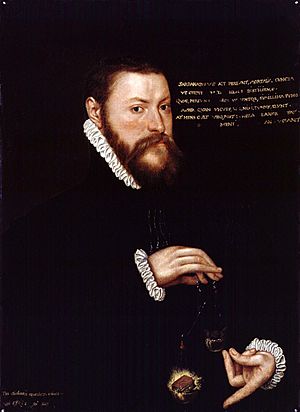Thomas Chaloner (statesman) facts for kids
Sir Thomas Chaloner (born 1521, died October 14, 1565) was an English statesman and a poet. He served his country as a diplomat and advisor to kings and queens. He was also a talented writer who created poems and other works.
Contents
Early Life and Education
Thomas Chaloner was born in 1521. His parents were Margaret Myddleton and Roger Challoner. His father, Roger, was a successful silk merchant in London. He also worked for King Henry VIII as a "Gentleman-Usher of the Privy Chamber." This meant he was an important attendant in the king's private rooms.
Roger Chaloner was also a "Teller of the Receipt of the Exchequer," which involved handling royal money. He was a "Freeman of the City of London" through the Mercers' Company, a powerful trade group. Roger died in 1550.
We don't know much about Thomas Chaloner's early childhood. However, we do know he received a good education. He studied at both Oxford University and Cambridge University. He likely attended St John's College at Cambridge.
A Career in Public Service
Sir Thomas Chaloner had a busy life serving his country. He traveled a lot and met many important people.
Early Missions and Knighthood
In 1540, Thomas Chaloner began his career as a secretary to Sir Henry Knyvett. He traveled with him to the court of Emperor Charles V. In 1541, he joined the Emperor's journey against Algiers, a city in North Africa. During this trip, his ship was wrecked off the coast.
In 1547, he joined an expedition to Scotland. After a battle near Musselburgh called Pinkie, he was made a knight by the protector Somerset. This was a great honor.
Diplomatic Roles and Challenges
Chaloner continued to work for the government, even though he had Protestant beliefs during a time of religious change. He was a witness in important legal cases against bishops in 1549 and 1551.
In 1551, he was sent to Scotland as a commissioner. His job was to help finalize the Treaty of Norham, an important peace agreement. He went again in March 1552.
In 1553, he traveled to France as part of an embassy, a group of official representatives. However, Queen Mary I called him back to England when she became queen.
Ambassador to European Courts
Despite his Protestant views, Queen Mary still used Chaloner's skills. He went to Scotland again in 1555 and 1556. He also helped with the war against France from 1557 to 1558.
When Queen Elizabeth I became queen, Chaloner continued his important work. In 1558, he became Elizabeth's ambassador to Emperor Ferdinand at Cambrai. From 1559 to 1560, he was the ambassador to King Philip II of Spain in Brussels.
In 1561, he went to Spain again as an ambassador. He wrote many letters complaining about how he was treated there. He was not allowed to return home until 1564, when his health was failing.
Later Life and Legacy
Sir Thomas Chaloner died at his home in Clerkenwell on October 14, 1565. During his years of service, he gained three large estates. These were Guisborough in Yorkshire, Steeple Claydon in Buckinghamshire, and St Bees in Cumberland.
He was married twice. His first wife was Joan. His second wife was Audrey Frodsham, and they had one son, who was also named Thomas Chaloner. Sir Thomas Chaloner was friends with many smart people of his time. He had a lifelong friendship with Lord Burghley, a very important advisor to Queen Elizabeth I.
Literary Contributions
Even with his busy political life, Sir Thomas Chaloner found time for writing. His Latin poems and pastoral poems (poems about nature and rural life) were very popular.
Major Works
Chaloner wrote a play about King Richard II for a book called Mirror for Magistrates, first published in 1559.
His most important work was De Rep. Anglorum instauranda libri decem. He wrote this book while he was in Spain. It was published in 1579. This book included compliments about Chaloner from Lord Burghley and others. The book also contained Chaloner's short, witty poems (epigrams) and writings for tombstones (epitaphs).
Other works by Chaloner include:
- The praise of folie, Moriae encomium (1549): This was his translation of a famous book by Erasmus.
- A book of the Office of Servantes (1543): A translation from Gilbert Cousin.
- An homilie of Saint John Chrysostome (1544): Another translation.
Recognition as a Poet
In 1598, Sir Thomas Chaloner was mentioned in a book called Palladis Tamia by Francis Meres. Meres listed Chaloner as one of the best pastoral poets of his time. He was named alongside famous writers like Sir Philip Sidney and Spencer. Palladis Tamia is important because it was one of the first books to talk about the poems and early plays of William Shakespeare.
 | Sharif Bey |
 | Hale Woodruff |
 | Richmond Barthé |
 | Purvis Young |


